克隆人Clone Man(高中英语作文)
克隆人 英语作文
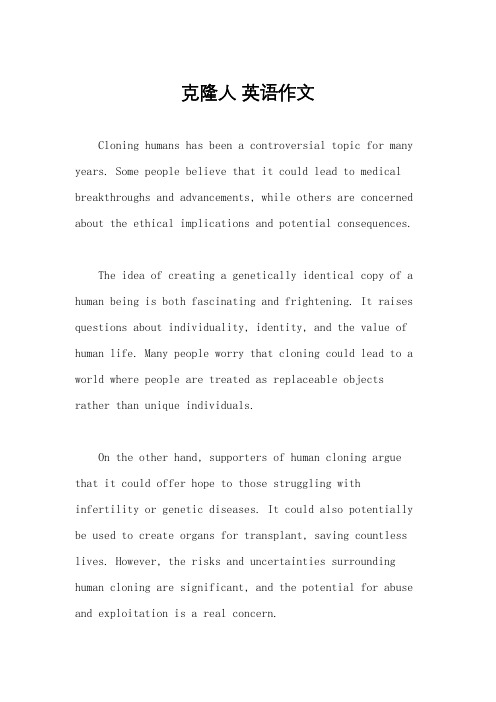
克隆人英语作文Cloning humans has been a controversial topic for many years. Some people believe that it could lead to medical breakthroughs and advancements, while others are concerned about the ethical implications and potential consequences.The idea of creating a genetically identical copy of a human being is both fascinating and frightening. It raises questions about individuality, identity, and the value of human life. Many people worry that cloning could lead to a world where people are treated as replaceable objects rather than unique individuals.On the other hand, supporters of human cloning argue that it could offer hope to those struggling withinfertility or genetic diseases. It could also potentially be used to create organs for transplant, saving countless lives. However, the risks and uncertainties surrounding human cloning are significant, and the potential for abuse and exploitation is a real concern.The ethical and moral implications of human cloning are complex and far-reaching. It forces us to confrontdifficult questions about the nature of humanity and the limits of scientific progress. While some may see cloning as a way to improve and extend human life, others fear that it could lead to a dehumanized and dystopian future.Ultimately, the debate over human cloning is not just about the science and technology involved, but also about our values and priorities as a society. It forces us to consider what it means to be human and what kind of world we want to live in. As we continue to grapple with these questions, it is important to approach the issue with caution and humility, recognizing the potential benefits and risks of this controversial technology.。
人类克隆英文作文
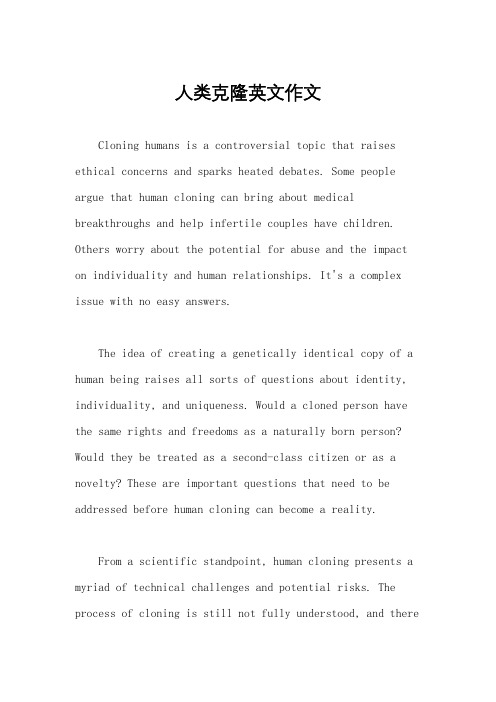
人类克隆英文作文Cloning humans is a controversial topic that raises ethical concerns and sparks heated debates. Some people argue that human cloning can bring about medical breakthroughs and help infertile couples have children. Others worry about the potential for abuse and the impact on individuality and human relationships. It's a complex issue with no easy answers.The idea of creating a genetically identical copy of a human being raises all sorts of questions about identity, individuality, and uniqueness. Would a cloned person have the same rights and freedoms as a naturally born person? Would they be treated as a second-class citizen or as a novelty? These are important questions that need to be addressed before human cloning can become a reality.From a scientific standpoint, human cloning presents a myriad of technical challenges and potential risks. The process of cloning is still not fully understood, and thereare concerns about the health and well-being of cloned individuals. There's also the issue of genetic diversity and the potential for creating a population of genetically identical people, which could have unforeseen consequences for the human race.On the other hand, proponents of human cloning argue that it could revolutionize medicine and help us better understand genetic diseases and find cures for them. It could also provide a solution for couples struggling with infertility, allowing them to have a genetically related child. However, these potential benefits must be weighed against the ethical and moral implications of creating and manipulating human life in this way.In conclusion, the debate over human cloning is far from over, and there are no easy answers. It's a complex issue that raises important questions about identity, individuality, and the value of human life. As technology continues to advance, it's crucial that we have open and honest discussions about the potential benefits and risksof human cloning, and that we consider the ethical implications before moving forward.。
克隆人的看法英语作文
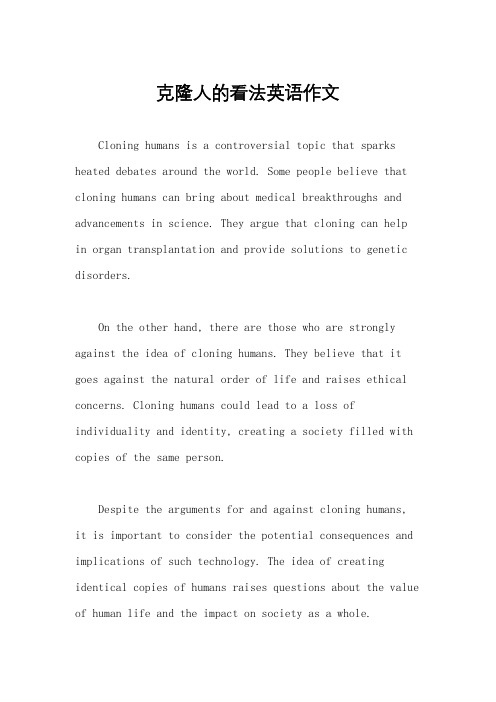
克隆人的看法英语作文Cloning humans is a controversial topic that sparks heated debates around the world. Some people believe that cloning humans can bring about medical breakthroughs and advancements in science. They argue that cloning can help in organ transplantation and provide solutions to genetic disorders.On the other hand, there are those who are strongly against the idea of cloning humans. They believe that it goes against the natural order of life and raises ethical concerns. Cloning humans could lead to a loss of individuality and identity, creating a society filled with copies of the same person.Despite the arguments for and against cloning humans, it is important to consider the potential consequences and implications of such technology. The idea of creating identical copies of humans raises questions about the value of human life and the impact on society as a whole.In conclusion, the debate over cloning humans is complex and multifaceted. It is essential to weigh the benefits and risks of this technology carefully before moving forward. Ultimately, the decision to clone humans should be made with caution and consideration for the ethical and moral implications.。
对克隆人的看法,好处和坏处英语作文
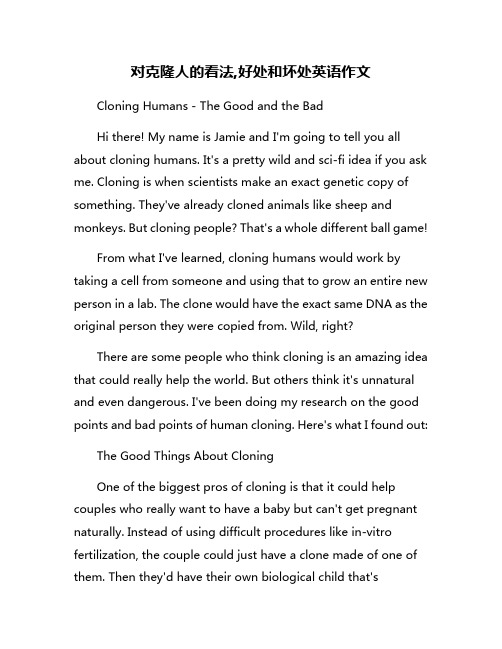
对克隆人的看法,好处和坏处英语作文Cloning Humans - The Good and the BadHi there! My name is Jamie and I'm going to tell you all about cloning humans. It's a pretty wild and sci-fi idea if you ask me. Cloning is when scientists make an exact genetic copy of something. They've already cloned animals like sheep and monkeys. But cloning people? That's a whole different ball game!From what I've learned, cloning humans would work by taking a cell from someone and using that to grow an entire new person in a lab. The clone would have the exact same DNA as the original person they were copied from. Wild, right?There are some people who think cloning is an amazing idea that could really help the world. But others think it's unnatural and even dangerous. I've been doing my research on the good points and bad points of human cloning. Here's what I found out:The Good Things About CloningOne of the biggest pros of cloning is that it could help couples who really want to have a baby but can't get pregnant naturally. Instead of using difficult procedures like in-vitro fertilization, the couple could just have a clone made of one of them. Then they'd have their own biological child that'sgenetically related to them. For people struggling with infertility, that could be a dream come true.Another good use could be cloning people to providelife-saving organs or tissue for transplants. Let's say someone needs a new kidney but can't find a donor match. Well, doctors could clone that person and then use the cloned organs or cells to help them. Since it's an exact genetic match, the body would be way less likely to reject it.Scientists could also clone humans to help bring back endangered species from the brink of extinction. If they could clone genetic code from the last remaining members, it could populate the species again from scratch. That could be huge for protecting animals at risk of going extinct forever.Finally, some people argue that cloning could allow humanity to bring back important historic figures from the past. Can you imagine how amazing it would be to clone geniuses and leaders like Albert Einstein, Marie Curie, or Abraham Lincoln? Their brilliant minds could help make the world an even better place today.The Bad Things About CloningOkay, those were some of the potential good uses of human cloning. But it's definitely not all positive. There are a lot of risks and ethical issues around the idea too.For one thing, cloning is very expensive and the success rates aren't that high yet. It can cost hundreds of thousands of dollars for each attempt. And in many cases, the clones end up with genetic defects or deformities that make them unhealthy or unable to survive. We'd need to get way better at perfecting the technology before it's ethical to try with humans.A lot of people also argue that cloning humans is just unnatural and kind of icky when you think about it too much. It makes an exact copy of someone instead of creating a totally new genetic individual through natural reproduction. Many religions and cultures see that as messing with the way life is supposed to happen.There are also huge philosophical questions around the idea of clones. Would the clone be considered its own person with rights and freedoms? Or would it basically be owned by the DNA donor it was copied from? You could even end up with clones being treated like property instead of independent human beings.Another major concern is the possibility of human cloning being misused. What if evil people tried to clone dictators or criminals? Or experts in weapons and warfare? Having that kind of knowledge multiplied could lead to terrible things happening. Cloning could be a risk to society if it got into the wrong hands.But maybe the biggest downside to me is how it would impact human diversity and evolution. If we start mass producing clones of the same people over and over, the entire gene pool could become less varied. Maybe that sounds good since it would cut down on inherited diseases. But it also means reducing the genetic diversity that helps species adapt to change over time. We might end up weaker for dealing with things like climate change or new diseases in the future.My ThoughtsSo those are some of the major pros and cons around cloning humans from what I've researched. I can definitely see good reasons why it could be helpful, like giving families a new way to have kids or boosting medical treatments. It would be amazing to bring back the genetic genius of people like Einstein or Curie too.But the risks and ethical issues around human cloning seem pretty huge to me as well. I really don't think we're ready for ityet as a society. There are still too many unknowns around how safe and effective it really is. Not to mention all the debates around things like clones' rights, reducing genetic diversity, and the technology being misused.Personally, I lean more towards thinking we shouldn't go too far down the human cloning path, at least not anytime soon. Let's focus more on other amazing scientific breakthroughs for now, like beating diseases, exploring space, or developing clean energy instead.But those are just my thoughts as a 10-year-old kid. I could be totally wrong! What do you think about the idea of human cloning and all its potential good and bad effects on the world? I'd love to hear your perspective. It's definitely a fascinating and futuristic topic to ponder!。
克隆人类英语作文
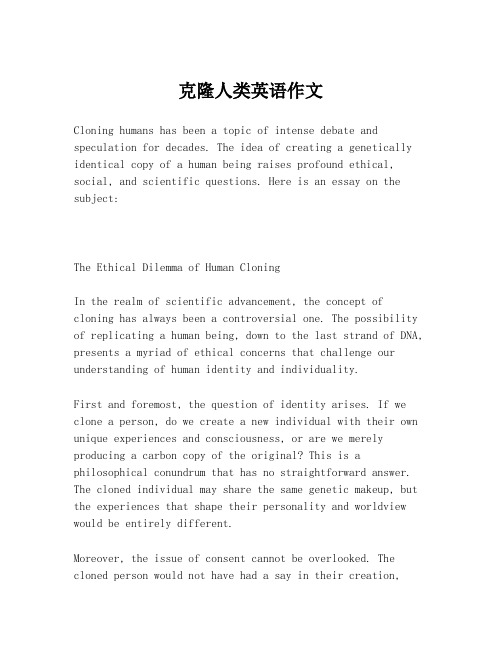
克隆人类英语作文Cloning humans has been a topic of intense debate and speculation for decades. The idea of creating a genetically identical copy of a human being raises profound ethical, social, and scientific questions. Here is an essay on the subject:The Ethical Dilemma of Human CloningIn the realm of scientific advancement, the concept of cloning has always been a controversial one. The possibility of replicating a human being, down to the last strand of DNA, presents a myriad of ethical concerns that challenge our understanding of human identity and individuality.First and foremost, the question of identity arises. If we clone a person, do we create a new individual with their own unique experiences and consciousness, or are we merely producing a carbon copy of the original? This is a philosophical conundrum that has no straightforward answer. The cloned individual may share the same genetic makeup, but the experiences that shape their personality and worldview would be entirely different.Moreover, the issue of consent cannot be overlooked. The cloned person would not have had a say in their creation,which raises questions about autonomy and the right to self-determination. This lack of consent could be seen as a violation of their basic human rights.Ethically, we must also consider the potential psychological impact on the clone. Growing up with the knowledge that they are a copy of someone else could lead to a complex array of emotional and psychological challenges. They may struggle with their sense of self and place in society, which could result in a range of mental health issues.From a societal perspective, the implications of human cloning are equally troubling. It could lead to a devaluation of human life, as the uniqueness of each individual is diminished. Furthermore, the potential for misuse of cloning technology, such as for the creation of 'designer babies' or to perpetuate the traits of a particular social elite, is a deeply concerning prospect.Scientifically, while cloning has been successful in other species, the application in humans presents numerous challenges. The process is fraught with risks, including high rates of miscarriage, birth defects, and other health complications. The long-term effects of cloning on human health are still largely unknown.In conclusion, human cloning is a complex issue that intertwines science with ethics. While the scientific community continues to explore the possibilities, it is imperative that society engages in a thoughtful and responsible dialogue about the implications of suchtechnology. The potential benefits must be weighed against the ethical considerations, and a consensus must be reached that respects the dignity and rights of all individuals, both original and cloned.This essay provides a balanced view of the topic, exploring the ethical, psychological, and societal implications of human cloning. It encourages readers to consider the broader context and consequences of such a scientific advancement.。
有关克隆人的英语作文
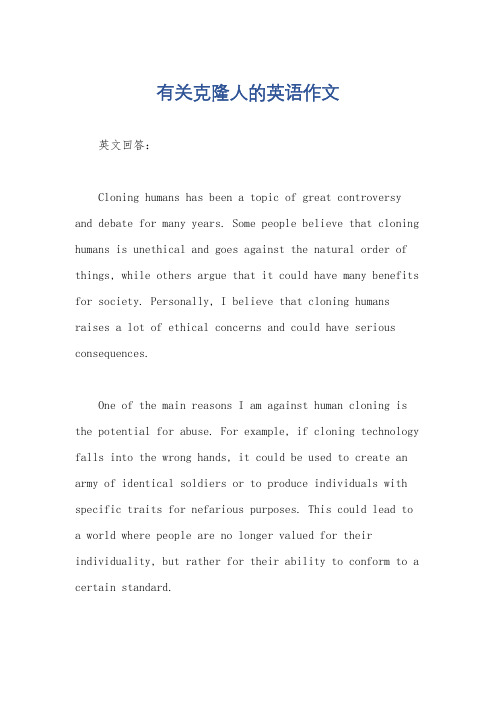
有关克隆人的英语作文英文回答:Cloning humans has been a topic of great controversy and debate for many years. Some people believe that cloning humans is unethical and goes against the natural order of things, while others argue that it could have many benefits for society. Personally, I believe that cloning humans raises a lot of ethical concerns and could have serious consequences.One of the main reasons I am against human cloning is the potential for abuse. For example, if cloning technology falls into the wrong hands, it could be used to create an army of identical soldiers or to produce individuals with specific traits for nefarious purposes. This could lead to a world where people are no longer valued for their individuality, but rather for their ability to conform to a certain standard.Another concern I have is the impact that human cloning could have on society as a whole. If cloning becomes widespread, it could lead to a lack of diversity and creativity in the gene pool. This could have negative effects on the overall health and resilience of the human population, as diversity is essential for adapting to new challenges and environments.Furthermore, there are also serious ethical considerations to take into account when it comes to cloning humans. For example, what rights would these cloned individuals have? Would they be treated as equals or as mere copies of their original selves? These are questions that need to be carefully considered before moving forward with human cloning.In conclusion, while human cloning may have some potential benefits, the risks and ethical concerns far outweigh any potential advantages. It is important to proceed with caution and to consider the implications of this technology before moving forward.中文回答:克隆人类一直是一个备受争议和辩论的话题。
作文人类克隆英文作文

作文人类克隆英文作文英文:Human cloning is a highly controversial topic that has sparked intense debates and ethical concerns. The idea of creating genetically identical copies of human beings raises a myriad of ethical, moral, and practical questions. On one hand, proponents argue that human cloning could potentially offer solutions to infertility, genetic diseases, and even provide organs for transplantation. On the other hand, opponents raise concerns about thepotential for abuse, exploitation, and the erosion of individuality.From a personal perspective, I believe that human cloning raises significant ethical and moral dilemmas. The idea of creating a duplicate of oneself raises questions about the uniqueness and individuality of human beings. If we were to clone a person, would they have the same rights and freedoms as a naturally born individual? Would they betreated as a mere commodity or object? These are complex questions that challenge our understanding of what it means to be human.Furthermore, the potential for abuse and exploitationis a real concern. For example, in the context of organ transplantation, there is a risk that cloned individuals could be seen as a source of spare parts rather than as autonomous beings with their own rights and agency. This dehumanization of cloned individuals is deeply troubling and raises serious ethical red flags.In addition to ethical concerns, there are also practical and scientific challenges associated with human cloning. The process is fraught with technical difficulties and has a high rate of failure. Moreover, the long-term health and well-being of cloned individuals remain uncertain. There have been numerous studies showing that cloned animals often suffer from a range of health issues, including premature aging and organ failure.In conclusion, while the idea of human cloning may holdsome potential benefits, the ethical, moral, and practical concerns cannot be ignored. The potential for abuse and exploitation, as well as the uncertainties surrounding the health and well-being of cloned individuals, raise serious red flags. As such, I believe that the risks and ethical dilemmas associated with human cloning outweigh any potential benefits.中文:人类克隆是一个备受争议的话题,引发了激烈的辩论和伦理关切。
克隆人 英语作文
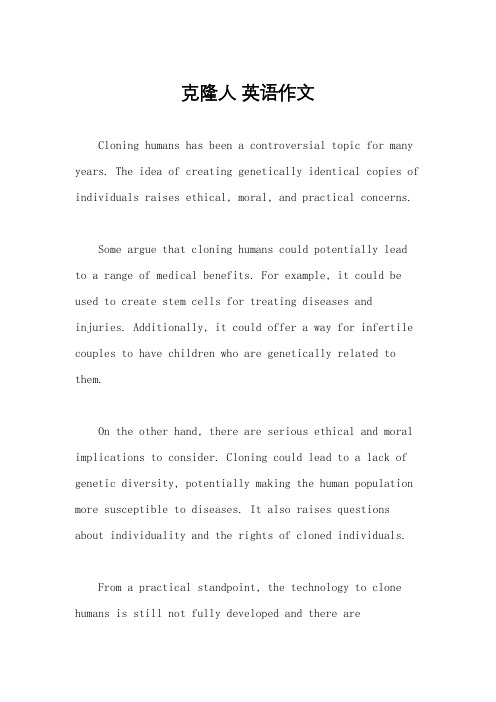
克隆人英语作文Cloning humans has been a controversial topic for many years. The idea of creating genetically identical copies of individuals raises ethical, moral, and practical concerns.Some argue that cloning humans could potentially lead to a range of medical benefits. For example, it could be used to create stem cells for treating diseases and injuries. Additionally, it could offer a way for infertile couples to have children who are genetically related to them.On the other hand, there are serious ethical and moral implications to consider. Cloning could lead to a lack of genetic diversity, potentially making the human population more susceptible to diseases. It also raises questions about individuality and the rights of cloned individuals.From a practical standpoint, the technology to clone humans is still not fully developed and there aresignificant risks involved. The process of cloning often results in genetic abnormalities and health issues in the cloned individual.Despite these concerns, the idea of cloning humans continues to fascinate and provoke debate. It is a complex issue that requires careful consideration of both the potential benefits and the ethical implications.。
